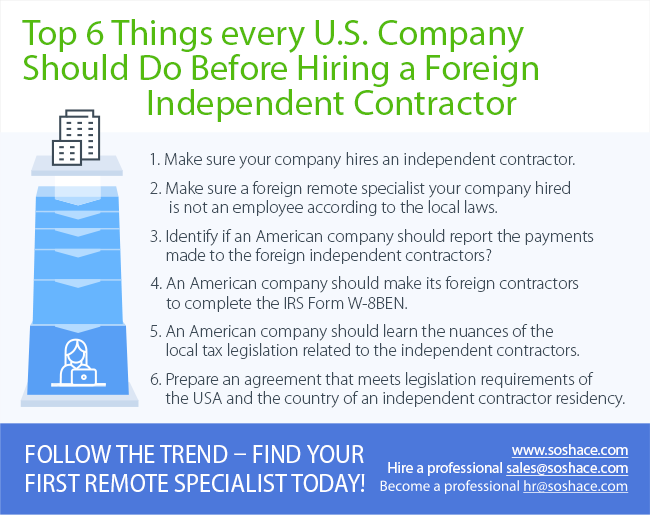1.Make sure your company hires an independent contractor
“If you want to solve a programming problem, pass it to an American programmer. If you want to solve a hard programming problem, pass it to a Chinese software programmer. If you want to solve an impossible programming problem, pass it to a Russian programmer!”
I am more than sure, that you have heard this saying many times and probably even wanted to hire a Russian programmer, web developer, software engineer, coder or app developer to solve your impossible programming problem, but didn’t know how to do it smoothly and legally compliant.It’s a pity, but very often companies don’t realize the risk of liability that they are being exposed to when hiring the overseas remote specialists without any local intermediary company.In this article we will review the top issues, which an American company should consider before hiring a foreign independent contractor without any professional assistance.
An independent contractor is a complex notion. Especially if you referring to an independent contractor within the definition wrought by the American employment laws. A Huge debate identifying who is an independent contractor and who is an employee, both the Tax and Employment Laws control this matter.
For example, in the state of MA there is a presumption of employment for anything defined as “an independent contractor” arrangement unless certain standards are met. The General Laws Chapter 149, § 148B, establish the three-part test applicable in Massachusetts. The statute “establishes a standard to determine whether an individual performing services for another shall be deemed an employee or an independent contractor, such as a consultant. Other states may differ. Your company needs to make sure that your remote specialist is an independent contractor according to his local legislation, for example, the Russian one.
According to the Russian legislation, an individual can work on the basis of an employment contract or perform services on the basis of a services contract, which is being referred to as a “civil law contract”. The civil law contracts are being used on the territory of the Russian Federation for identifying a cooperation relationship which can achieve a specific result within a defined period of time.
A contractor, according to the Russian law would normally use his or her resources and work as an independent specialist without a constant supervision from the payer side. According to the Russian employment law, an employee is a person who is personally performing the work, who is working in compliance with the internal procedures and handbooks of the employer and under his control. The employer, according to the Russian law must provide proper working conditions to his employees (working place, necessary equipment, and tools). Why this aspect is so important?
2. Make sure a foreign remote specialist your company hired is not an employee according to the local laws
Your American company can be fined if your foreign independent contractor is actually an employee. The Internal Revenue Service (The IRS) identifies an independent contractor as a person in an independent trade, business or profession, offering his services to the general public. The payer of an independent contractor can only control the result of work and not the way it is being done.
According to the American legislation, a foreign independent contractor is responsible for paying taxes on his own. The American companies hiring them do not have to withhold income taxes and pay Social security, Unemployment or Medicare tax.
An employee, according to the U.S. law is a person, whose performance is being controlled by the payer. It means that the level of control and the level of independence identifies the nature of relationships between a company and an employee or an independent contractor.
If an American court or the Internal Revenue Service identifies that your company hires a remote specialist as an independent contractor and your contractor is really an employee, you can face liabilities for breaking the employment legislation. Your company would have to pay that person all the unpaid social and medical taxes, worker compensation premiums, unpaid benefits for the unused annual leaves and sick leaves, as well as interest and penalties. On average, every year the US Labour Department identifies more than 300 000 cases of misclassification of employees as independent contractors. If the Labour Department or the Internal Revenue Service detects the infringement, they will conduct an investigation of all the company’s employees and contractors of a period of three years before the present. For each violation, the company will have to pay large penalties.
For example if a remote worker lives in the US, each unfilled W-2 form costs an employer $50, as well as a company will also have to pay the penalties of 1,5% of the employee wage, 40% of unpaid Medicare and Social Security taxes, and 100% of the matching FICA taxes, which were not paid before (very often an interest is being added too), penalty under Section 6651 for the failure-to-file the Form 941 employment tax return is 5%-25%, additional fines if the IRS identifies intentional misconduct or fraud. If a remote worker lives outside the USA, there will be a lot of liabilities under the local laws and the cost of making a mistake will be different.
In the European Union countries, your American company would have to pay at least four weeks of an annual leave per each year of cooperation, in addition to that, you would have to pay all the unpaid wages and taxes. In France, for example, a remote worker fake self-employed status can bring an employer huge fines and up to 3 years of imprisonment. In the countries of South America (Argentina, Bolivia, Brazil, Chile, Colombia, Ecuador, Guyana, Paraguay, Peru, Uruguay, and Venezuela) the local legislation imposes similar limitations and penalties.
It should be mentioned that the American companies hiring foreign remote specialists can often face more risks and liabilities in the local jurisdictions of workers residency. In the EU an employee is entitled to the severance pay under the termination clause, while an independent contractor can be terminated without any additional payment. Due to this reason, an unhappy independent contractor from the EU can decide to pursue a severance pay award in the local court and easily proof his employee status.
In the post-USSR countries, such as Russia, Ukraine, and Belarus, there are huge legislative lacunas and legal gaps regarding the remote workforce and it is safer for an American company to cooperate with a remote specialist from Russia, Belarus or Ukraine. There were no precedents registered by this moment of time when a remote specialist, independent contractors, from Russia, Belarus or Ukraine tried to sue an American or the EU company for their severance pay award and employee status identification. In addition, specialists from the Post USSR countries are really professional and qualified and their hourly rates are minimal in comparison to the American or European.
Besides in the Post USSR countries, there is no legislation, which controls the remote workforce there, the American companies may face other difficulties, like the IP law compliance problems while working with the remote specialists from these countries. To neutralize these risks, we recommend your company to cooperate with the remote specialists from Russia, Ukraine or Belarus via official intermediaries (like Soshace). We have professional legal advisers in our team and can guarantee that our remote web developers are diligent.
3. Identify if an American company report the payments made to the foreign independent contractors?
According to U.S. law, an American company should file the Form 1042 and 1042-S, that a foreign person has a U.S. source income. The IRS issued a guidance on how to determine the sources for the different types of income for the foreign independent contractors. The US law identifies the source of personal services income by where services were performed and delivered (the country of an independent contractor residency). It means that even if a foreign independent contractor works for an American company, but lives in Russia, his income is not a U.S. source income, as long as the service is performed outside of the U.S. and this American company is not obliged to withhold or report taxes. The contractor only needs to pay his local country tax on his income received from the company.
4. An American company should make its foreign contractors to complete the IRS Form W-8BEN
If an American company hires an independent contractor who is a U.S. resident, he/she should fill the form W-9, but if the contractor is a foreigner and resides abroad he/she should file the form W-8BEN. Even though these American companies are not obliged to report to the IRS, they have to make their foreign contractors to fill the Form W-8BEN for the private individuals or W-8BEN-E for the legal entities. These forms are being used for a foreign status establishing.
5.An American company should learn the nuances of the local tax legislation related to the independent contractors
It is obvious that an American employer should know how the labor law of an independent contract residency can distinguish independent contractors from the employees as well as how the tax laws treat the payments to the independent contractors because it can be different. For example, if a company (an employer) is not a resident of the Russian Federation, then it has no obligation to report the payments made to these contractors to the Russian authorities or withhold taxes. We recommend you to include in the contractor`s duties a requirement to follow the local tax legislation and pay the taxes of the country of his residence.
6. Prepare an agreement that meets legislation requirements of the USA and the country of an independent contractor residency
To meet both regulations can be complicated. This can be costly as well because harmonizing contracts is cumbersome. We would suggest that the parties identify the applicable law terms beforehand and make sure that the contract is compliant with the relevant law. In other words, you would want to clearly identify that the relationship falls under the US laws first, and then write the contract under the U.S laws, this will simplify greatly cooperation from the employment law perspective and for the tax law perspective which we outlined in the article. It will also allow you to make sure that you are hiring an independent contractor if that is the intention.
Follow the trend – find your first virtual specialist today!











